john f kennedy
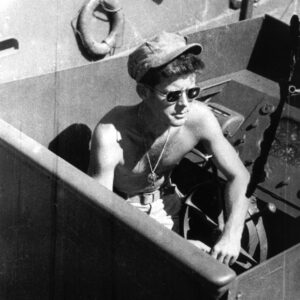
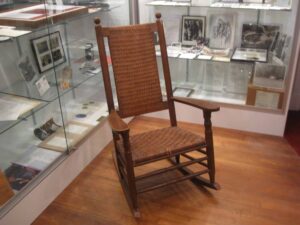 John F Kennedy, who at the time was still our future president, had to “fight” his way into war. His father believed it would make his son more “marketable” for a political run that would eventually land him in the White House. Joseph Kennedy wanted one of his sons to eventually be president, and I’m not sure he was particular about which one it was. He just knew that to have a chance, the “candidate” would have to have a military background. The reasons for his entrance into World War II really don’t matter now, because while he was in the service, he did his country proud, and even saved the lives of his PT-109 crew after a Japanese destroyer rammed them on August 2, 1943.
John F Kennedy, who at the time was still our future president, had to “fight” his way into war. His father believed it would make his son more “marketable” for a political run that would eventually land him in the White House. Joseph Kennedy wanted one of his sons to eventually be president, and I’m not sure he was particular about which one it was. He just knew that to have a chance, the “candidate” would have to have a military background. The reasons for his entrance into World War II really don’t matter now, because while he was in the service, he did his country proud, and even saved the lives of his PT-109 crew after a Japanese destroyer rammed them on August 2, 1943.
Future President Kennedy could have avoided the war completely, because he had back issues which were likely caused from a football injury. In addition, the fact that he was from a wealthy family could have been a big help in any effort he might have used to stay out of the war. He didn’t use the family’s money or influence to stay out, however. Before entering World War II, Kennedy graduated with honors from Harvard, and then still chose to serve. After being drafted to by the Navy, the physical toll on his back increased, including the physically demanding couple of days when the ship he commanded sank and he literally helped his crew survive.
Later, while he was serving as a young senator, Kennedy’s doctor prescribed a rocking chair to be used during his service in the senate. No matter where the pain initially started or what exacerbated the issue, by the time 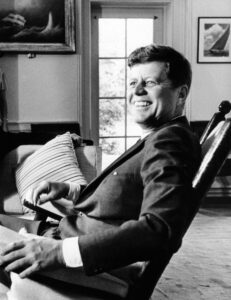
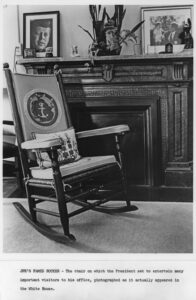 John F Kennedy was in the office of president, he was in constant pain. When he began using the rocking chair in 1955, Kennedy finally found a way for his muscles to relax by constantly being forced to expand and contract while sitting. The rocking chair he chose was made by P and P Chair Company, and Kennedy grew to love it. He finally found some relief, and he actually insisted that the chair be brought aboard Air Force One when he traveled. Later he just purchased many different chairs for his various residences. So impressed was Kennedy with this chair, that he also gifted dozens of the same chair to friends and colleagues. You might say that the rocking chairs from P and P Chair Company were unofficially known as the presidential rocking chairs.
John F Kennedy was in the office of president, he was in constant pain. When he began using the rocking chair in 1955, Kennedy finally found a way for his muscles to relax by constantly being forced to expand and contract while sitting. The rocking chair he chose was made by P and P Chair Company, and Kennedy grew to love it. He finally found some relief, and he actually insisted that the chair be brought aboard Air Force One when he traveled. Later he just purchased many different chairs for his various residences. So impressed was Kennedy with this chair, that he also gifted dozens of the same chair to friends and colleagues. You might say that the rocking chairs from P and P Chair Company were unofficially known as the presidential rocking chairs.
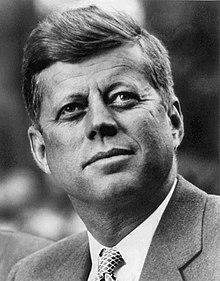
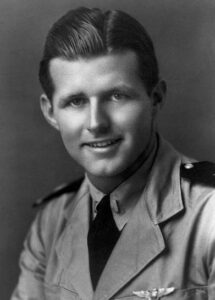 John F Kennedy never really wanted to be the President of the United States, but his dad wanted one of his sons, and maybe more that one of his sons to be the president, and Joseph Kennedy Sr made that fact well known to his boys. It was always assumed that Joseph Kennedy Jr would be the son to make their dad’s dreams come true, but life doesn’t always go quite the way we planned it.
John F Kennedy never really wanted to be the President of the United States, but his dad wanted one of his sons, and maybe more that one of his sons to be the president, and Joseph Kennedy Sr made that fact well known to his boys. It was always assumed that Joseph Kennedy Jr would be the son to make their dad’s dreams come true, but life doesn’t always go quite the way we planned it.
Joseph Kennedy Jr was the Golden Boy, touted by his father as a child destined to be “the future president of the nation.” He was a skilled athlete, charismatic, and intelligent, he was educated at Harvard and the London School of Economics. His father had groomed him to be president from a very young age, but it was not to be. When World War II drew the United States in, Joe Jr felt called to enlist. He joined the US Navy in 1941, and in 1943 was sent to England, where he flew with the British Naval Command and volunteered to take part in Operation Aphrodite.
Operation Aphrodite and Operation Anvil were the “World War II code names of United States Army Air Forces and United States Navy operations to use Boeing B-17 Flying Fortress and Consolidated PB4Y bombers as precision-guided munitions against bunkers and other hardened/reinforced enemy facilities, such as “Crossbow” operations against German long-range missiles,” specifically the V-3 Super Gun that Hitler was having built. During one of his missions, on August 12, 1944, the explosives aboard a plane flown by Joe Jr detonated early, and the eldest Kennedy son was gone.
As the second-oldest son in the Kennedy family, John F Kennedy was aware that the political aspirations of his father, Joe Sr, rested heavily on his older brother, Joseph P Kennedy Jr. When his brother was killed during WWII, John was also aware that the political torch had just passed to him…and so it did. It didn’t matter that John “was sickly – described by the family patriarch as ‘a very frail boy’ with ‘various troubles’ – and less willing to conform to his father’s will, he had been educated in much the same way as his older brother and was politically astute.” John had always been more of a passive observer. John apparently told one of his friends, “Now the burden falls on me.” Later, in an interview, he recalled what it was like to be shifted into his father’s spotlight, saying, “It was like being drafted. My father wanted his oldest son in politics. ‘Wanted’ isn’t the right word. He demanded it. You know my father.”
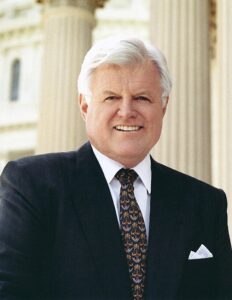
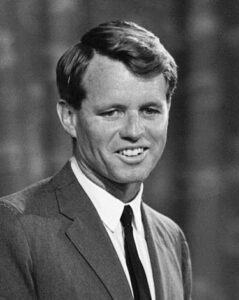
By 1947, John Kennedy was a member of the US Congress, the first office he held as he began his journey to becoming the President of the United States in 1960. His father was very determined and would stop at nothing to be able to say, “my son the President of the United States.” He also wanted his other sons, Robert and Ted to be in politics as well. Joe Sr’s “push of his sons” really was the indirect cause of the deaths of John and Robert, in my opinion. Of course, there were other factors, as we all know, but for them, being thrust into the spotlight did place a target on their backs. I don’t know if Robert and Ted were originally interested in politics, but the influence of their dad had to have played a big part in their future political lives.
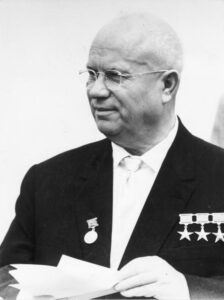 It’s never a good idea to find your nation behind it’s enemies in the arms race. Never was that made more clear than during the Cold War. It’s also not a good idea to begin to brag to your enemies about the superiority of your nation over theirs concerning the nation’s arms race status. Nevertheless, in a long and rambling interview with an American reporter on November 15, 1957, Soviet leader Nikita Khrushchev claimed that the Soviet Union had missile superiority over the United States. He then went on to challenge America to a missile “shooting match” to prove his assertion. It was a bold move, and one that fueled fears in the United States that the nation was indeed falling behind the Soviets in the arms race. People began to worry about not only the idea of the United States falling behind in the arms race, but also the idea that the Soviet Union and Nikita Khrushchev might actually launch their missiles at the US.
It’s never a good idea to find your nation behind it’s enemies in the arms race. Never was that made more clear than during the Cold War. It’s also not a good idea to begin to brag to your enemies about the superiority of your nation over theirs concerning the nation’s arms race status. Nevertheless, in a long and rambling interview with an American reporter on November 15, 1957, Soviet leader Nikita Khrushchev claimed that the Soviet Union had missile superiority over the United States. He then went on to challenge America to a missile “shooting match” to prove his assertion. It was a bold move, and one that fueled fears in the United States that the nation was indeed falling behind the Soviets in the arms race. People began to worry about not only the idea of the United States falling behind in the arms race, but also the idea that the Soviet Union and Nikita Khrushchev might actually launch their missiles at the US.
Khrushchev tried to compare the arms race to the space race, saying that if the United States had intercontinental ballistic rockets, “she had would have launched her own Sputnik.” Khrushchev was crossing boastful belligerence and calls for “peaceful coexistence” with the West, in what was a classic move for him. He bragged about Soviet missile superiority, claiming that the United States did not have what the Soviet Union had. Then, as cool as a cucumber, he issued a challenge, saying, “Let’s have a peaceful rocket contest just like a rifle-shooting match, and they’ll see for themselves.”
Following his fear-inspiring statements, Khrushchev began to speak about the future of East-West relations, saying that the American and Soviet people both wanted peace. He cautioned that although the Soviet Union would never start a war, “some lunatics” might bring about a conflict. In particular, he noted that Secretary of State John Foster Dulles had created “an artificial war psychosis.” In the case of war, it “would be fought on the American continent, which can be reached by our rockets.” NATO forces in Europe would also be devastated, and Europe “might become a veritable cemetery.” While the Soviet Union would “suffer immensely,” the forces of communism would ultimately destroy capitalism.
Khrushchev made these remarks just a few days after the Gaither Report had been leaked to the press in the 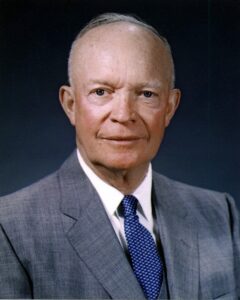 United States. The report supported many of the Russian leader’s contentions, charging that the United States was falling far behind the Soviets in the arms race. Of course, the critics of President Dwight D Eisenhower’s foreign policy, especially the Democratic Party, went on the attack, calling Eisenhower weak. The Gaither Report called for “an urgent strengthening of US missile technology, along with offensive and defensive military capabilities. The report also called for a fifty percent increase in US military spending and a redesign of the US Defense Department.” The Gaither Report was presented to President Eisenhower on November 7, 1957. The report suggested that Eisenhower’s military policy…the reliance on cheap nuclear weapons instead of expensive Army divisions…was inadequate. He kept the Report secret and generally ignored it, but its conclusions were leaked to the press. The public debate concerning the alleged “missile gap” between US and Soviet rocket arsenals continued through the early 1960s and became a major issue in the 1960 presidential campaign between Richard Nixon and John F Kennedy.
United States. The report supported many of the Russian leader’s contentions, charging that the United States was falling far behind the Soviets in the arms race. Of course, the critics of President Dwight D Eisenhower’s foreign policy, especially the Democratic Party, went on the attack, calling Eisenhower weak. The Gaither Report called for “an urgent strengthening of US missile technology, along with offensive and defensive military capabilities. The report also called for a fifty percent increase in US military spending and a redesign of the US Defense Department.” The Gaither Report was presented to President Eisenhower on November 7, 1957. The report suggested that Eisenhower’s military policy…the reliance on cheap nuclear weapons instead of expensive Army divisions…was inadequate. He kept the Report secret and generally ignored it, but its conclusions were leaked to the press. The public debate concerning the alleged “missile gap” between US and Soviet rocket arsenals continued through the early 1960s and became a major issue in the 1960 presidential campaign between Richard Nixon and John F Kennedy.

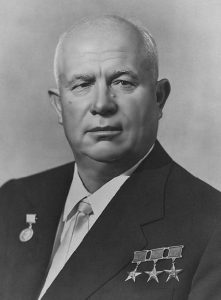 For anyone alive and of an age to remember it, the 1950s and 1960s brought with them a strange new reality. I can’t say that I fully understood it all at that time, but I remember our school having a “Fallout Shelter.” They were also called a “Bomb Shelter” in some places, and the purpose was to protect the population from exposure to the fallout from a nuclear explosion. I suppose that if I had understood more about what these were, I might have been scared, but I just remember thinking it a strange idea, and highly unlikely. It did occur to me that if a bomb to explode, it would be unlikely that we would all have time to get to the school for protection.
For anyone alive and of an age to remember it, the 1950s and 1960s brought with them a strange new reality. I can’t say that I fully understood it all at that time, but I remember our school having a “Fallout Shelter.” They were also called a “Bomb Shelter” in some places, and the purpose was to protect the population from exposure to the fallout from a nuclear explosion. I suppose that if I had understood more about what these were, I might have been scared, but I just remember thinking it a strange idea, and highly unlikely. It did occur to me that if a bomb to explode, it would be unlikely that we would all have time to get to the school for protection.
Apparently, President John F. Kennedy, agreed with me on that thought, because, when he was speaking on civil defense on October 6, 1961, he advised American families to build bomb shelters to protect them from atomic fallout in the event of a nuclear exchange with the Soviet Union. We were, after all, in the middle of the Cold War, and neither side really knew if the other side would decide that they needed to start that latest, deadly type of war with the other side. Looking back, many people aren’t sure that a home-made bomb shelter would really be able to protect the occupants from the fallout of an atomic bomb. No one can really say for sure that the government-built shelters in schools and churches could either, in retrospect.
Still, prudent minds assumed that something needed to be done. Kennedy also assured the public that the United States civil defense program would soon begin providing such protection for every American. What seemed like science fiction, became a grim possibility just one year later, when true to Kennedy’s concerns, the world hovered on the brink of full-scale nuclear war when the Cuban Missile Crisis erupted over placement of nuclear missiles in Cuba by the USSR. Of course, panic ensues. The crisis lasted for 13 days, but some Americans prepared for nuclear war by buying up canned goods and completing last-minute work on their backyard bomb shelters. In the end, of course, it all ended without. After several days of tense negotiations, Kennedy and Khrushchev reached an agreement. Publicly, the Soviets would dismantle their offensive weapons in Cuba and return them to the Soviet Union, subject to United Nations verification, in exchange for a US public 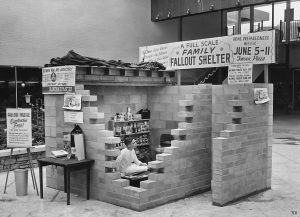
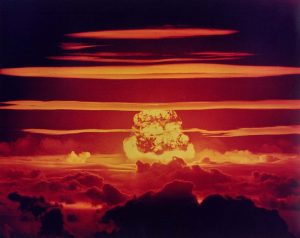 declaration and agreement to avoid invading Cuba again. The Kennedy administration had been publicly embarrassed by the failed Bay of Pigs Invasion in April 1961, which had been launched under President John F Kennedy by CIA-trained forces of Cuban exiles. Afterward, former President Dwight Eisenhower told Kennedy that “the failure of the Bay of Pigs will embolden the Soviets to do something that they would otherwise not do.” He was right, but for now, disaster was averted.
declaration and agreement to avoid invading Cuba again. The Kennedy administration had been publicly embarrassed by the failed Bay of Pigs Invasion in April 1961, which had been launched under President John F Kennedy by CIA-trained forces of Cuban exiles. Afterward, former President Dwight Eisenhower told Kennedy that “the failure of the Bay of Pigs will embolden the Soviets to do something that they would otherwise not do.” He was right, but for now, disaster was averted.
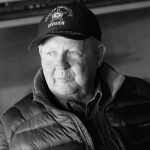 We all know about the Secret Service, but do we really know about them. They are always standing near the President and the other people they are sworn to protect, but most of the time they are virtually invisible. It’s not that we can’t see them, but rather that we don’t notice them, unless something goes haywire. Then their presence is very well known as the whisk the President to safety, while looking for the culprit who has dared to enter that guarded space that surrounds him.
We all know about the Secret Service, but do we really know about them. They are always standing near the President and the other people they are sworn to protect, but most of the time they are virtually invisible. It’s not that we can’t see them, but rather that we don’t notice them, unless something goes haywire. Then their presence is very well known as the whisk the President to safety, while looking for the culprit who has dared to enter that guarded space that surrounds him.
That is information we probably all know, but the Secret Service is much more. Founded in 1865, as an agency to stop counterfeiting, the past 150 years have seen many changes to that institution. Because it is their job to protect those they serve, the Secret Service agents must know a great deal about the people they guard, but they must also know a great deal about the essence of the political process.
Depending on their own interests, the President’s hobbies can be a pain for the Secret Service agents. If the President wants to go jogging, the Secret Service must go along, whether they like to jog or not. Also, the route must be checked, and can be a security nightmare. This applies to any trip the President makes as well. 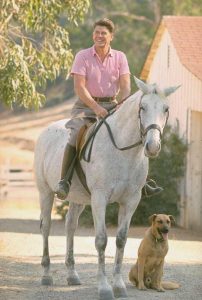 The hotel, route, and especially the areas where he might be spending time, have to be checked and re-checked. There is no room for error, because if a gunman finds a place to hide, the President’s life could be in grave danger.
The hotel, route, and especially the areas where he might be spending time, have to be checked and re-checked. There is no room for error, because if a gunman finds a place to hide, the President’s life could be in grave danger.
Guarding the President also meant guarding his family, and if the children were young, it was much like being a glorified babysitter. The agent had to go to friends’ houses, ice cream parlors, toy stores, and a number of other places. Not all first children are well behaved, and the Secret Service witnessed it share of tantrums. If the kids didn’t like how things were going, they simply called their parents, who often told the agents to “take the child wherever he/she wanted to go.” This usually served to make the kids more bold and belligerent. Of course, not all of the children were unruly, but I would imagine that more were, than weren’t.
The Secret Service had to remain bi-partisan, because no matter what their political views were, their job was to protect the President, regardless of his political affiliation. The Secret Service agents also had to deal with the reckless behavior of the Presidents they served. Some Presidents were promiscuous, and expected their agents to warn them if their wife was coming in. Others were reckless with their own safety, as was the case when John F Kennedy, who insisted on riding through Dallas in a convertible on that fateful November day in 1963.
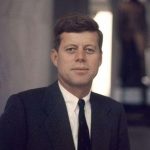 While guarding the President of the United States can be stressful and worrisome, it can also be very rewarding. Of course, the Secret Service agents travel the world with the President, and they have front row seats to some of the greatest events in history. Still, some Secret Service agents actually bond with the President. Such was the case with President Ronald Reagan and Agent John Barletta. Agent Barletta says of President Reagan, “We worked so well together. The whole relationship was a projection of him, how he was… He was a great guy to be around. I wouldn’t trade those years for anything.” For most of the Secret Service agents, it is an honor and a privilege to protect the President. It doesn’t matter if the work id time consuming, complicated, and stressful. These men and women feel born to protect the President.
While guarding the President of the United States can be stressful and worrisome, it can also be very rewarding. Of course, the Secret Service agents travel the world with the President, and they have front row seats to some of the greatest events in history. Still, some Secret Service agents actually bond with the President. Such was the case with President Ronald Reagan and Agent John Barletta. Agent Barletta says of President Reagan, “We worked so well together. The whole relationship was a projection of him, how he was… He was a great guy to be around. I wouldn’t trade those years for anything.” For most of the Secret Service agents, it is an honor and a privilege to protect the President. It doesn’t matter if the work id time consuming, complicated, and stressful. These men and women feel born to protect the President.

